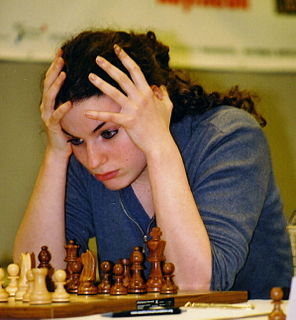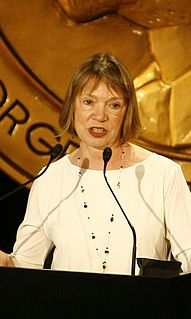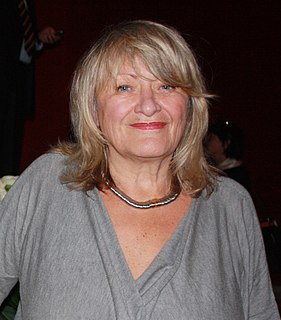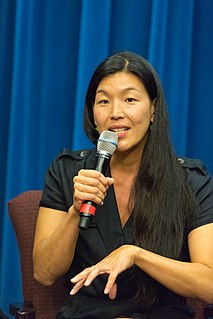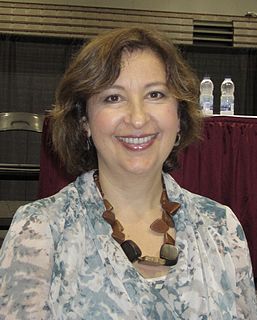Top 396 Feminists Quotes & Sayings - Page 7
Explore popular Feminists quotes.
Last updated on December 18, 2024.
What shocked me was three different anti-prostitution feminists asking me to justify that I had been a sex worker, to prove it. That either I hadn't done enough sex work by their standards, or I hadn't done the right kind in order to have the right to speak about it. I couldn't understand them. I'm not speaking for you. I'm not speaking "for" anyone. I'm trying to put together this picture of the different forces that are producing a result in the lives of sex workers. You can't contest the fact that tons of people are going to jail and experiencing violence.
Most chess books only sell a few thousand copies, and a book titled something like "Women in Chess" would sell even fewer. The idea with this title was to spread the book outside the competitive chess world. I'm interested in attracting readers who love chess but play only casually, and feminists interested in male-dominated fields.
You know I really don't like to think about the fact that I'm a girl in relation to the music industry. I was just a kid who wrote down thoughts to organize her brain and that turned into music, like any other writer or musician... so, I happen to be a girl. I don't consider that part of it really.. It may disappoint some feminists out there that I don't want to harp on women and men being equal.
Feminists do the best Photoshop because they leave the meat on your bones. They don’t change your size or your skin color. They leave in your disgusting knuckles, but they may take out some armpit stubble. Not because they’re denying its existence, but because they understand that it’s okay to make a photo look as if you were caught on your best day in the best light.
..."Fun?" you ask. "Weren't feminists these grim-faced, humorless, antifamily, karate-chopping ninjas who were bitter because they couldn't get a man?" Well, in fact the problem was that all too many of them HAD gotten a man, married him, had his kids, and then discovered that, as mothers, they were never supposed to have their own money, their own identity, their own aspirations, time to pee, or a brain. And yes, some women indeed became bad-tempered as a result. After all, no anger, no social change.
An ethic of maternalism was central to the utopianism of 19th century feminists. I don't think that today's women see motherhood as a source of personal power, let alone political power. I don't think that women now have that same sense that their lives as mothers gives them any special power or virtue. I think women see their lives as mothers as an adjunct to their working lives - a fulfilling and important adjunct, to be sure - but something they do in addition to working in the public realm, not because being a wife and mother gives them a distinct edge in improving the world as we know it.
The original feminists wanted two things. They wanted the right to vote, from which we could work to get more equality. And we have made progress. We did pass the anti-discrimination law, Title 7, Title 9, equality in the workplace, equality in education and in sports and in all these other areas. But enforcement is very hard. Changing stereotypes is very hard.
When I grew up, feminism wasn’t something that was really talked about. There’s a really negative stereotype about feminism in the media. That really plays badly for young women understanding the movement. Maybe people don’t want to identify themselves as feminists because of the label. But people need to understand what feminism means and educate themselves before they reject it.
I think magazines like Glamour have the ability to have a great impact. Glamour has the ability to expose them to things like feminism that they may not be well acquainted with. In fact, Glamour has done that in the past - when I was in eighth grade I read an article in Glamour magazine about female feticide and infanticide that actually sparked my entire interest in feminism. I hate it when some feminists say we should get rid of beauty and fashion magazines - I think there's room in feminism for fashion, for fun, for talking about sex and friendships and relationships, etc.
As a general rule, when something gets elevated to apple-pie status in the hierarchy of American values, you have to suspect that its actual monetary value is skidding toward zero. Take motherhood: nobody ever thought of putting it on a moral pedestal until some brash feminists pointed out, about a century ago, that the pay is lousy and the career ladder nonexistent. Same thing with work: would we be so reverent about the 'work ethic' if it wasn't for the fact that the average working stiff's hourly pay is shrinking, year by year.
Does political correctness have a good side? Yes, it does, for it makes us re-examine attitudes, and that is always useful. The trouble is that, with all popular movements, the lunatic fringe so quickly ceases to be a fringe; the tail begins to wag the dog. For every woman or man who is quietly and sensibly using the idea to examine our assumptions, there are twenty rabble-rousers whose real motive is desire for power over others. The fact that they see themselves as antiracists or feminists or whatever does not make them any less rabble-rousers.
As soon as you opened your mouth and said the word woman, you were beaten down with the argument that you were betraying the class struggle. There are many poignant writings in which feminists first write pages about their class standpoint before getting to their actual issue. What was then known as class warfare is today called anti-racism. The threat of being accused of racism gave birth to false tolerance.
America's got to look after America again. That means taking a realistic appraisal of who is actually at risk in this country, not whining feminists, or whinging Black Lives Matter activists, but gay people and women at risk from Islam. Also, so people in this country who have been treated badly, lied to and lied about. An honest appraisal of who actually needs government attention in this country. And when all of that is done, then we can think about interfering elsewhere again.
I think we really need a movement to drive how popular culture understands the issues that feminists care about. When I think about the LGBT movement for example, they have had a really intentional strategy to try to change images and representation of LGBT people in the media and the culture. It really moved the dial politically. That's what is needed in the women's movement - a strategy that can drive awareness and culture change.
I love my country, By which I mean, I am indebted joyfully, To all the people throughout its history, Who have fought the government to make right, Where so many cunning sons and daughters, Our foremothers and forefathers, Came singing through slaughter, Came through hell and high water, So that we could stand here, And behold breathlessly the sight, How a raging river of tears, Cut a grand canyon of light... Why can't all decent men and women, Call themselves feminists? Out of respect, For those who fought for this...
Young women don't want to be called feminists because it's not sexy and ah they think that their mothers and grandmothers have achieved everything they want. They don't know how poor women live, how women in rural places live, how 80 percent of women in the world are the poorest of the poor, how still there are 27 million slaves, and most of them women and girls.
There are Harvard grads, free thinkers, feminists, abolitionists, well-to-do people who want to go write poetry and live on a farm and cook and laugh and have a good time. As they themselves described it, it was an "inward facing" community. They were focusing on making a better existence for themselves, which I think is also the driving force of 20th century communalism in the US, the thought being that the world is corrupt, and we're going to build this little garden of innocence.
Most feminists in France came to feminism after '68 as a result of the hypocrisy they experienced in leftist movements. In these movements, where everyone believed there was going to be true equality, fraternity between men and women, and that together they were going to struggle against this rotten society, even there they noticed that the leftists, the militants, kept them "in their place." Women made the coffee while the others did the talking; they were the ones who typed the letters.
I think that blogging and the Internet has completely changed feminism for ever, I think. You know, it used to be, 10 years ago, if you wanted to have a strong, influential voice in the feminist movement, you really needed to be part of this New York/D.C. elite group of feminists, or part of a mainstream feminist organization. And now it's kind of an amazing thing that you can just start a blog and put your voice out there and build your readership.
I can't really speak to what it was like to call yourself a feminist in the past on a personal level but I think calling oneself a feminist in the past may have been inimical because feminists in the '70s were the first to really challenge deeply embedded gender roles and demand concrete political and economic rights. They were asking for rights that seemed like a direct threat to those in power - they were asking for equality in a society that didn't have it in an obvious way. They were put down and villainized because they were seen as threatening.
Whether people identify as feminists or not, if they're doing work that furthers a feminist cause, I think that's wonderful, like if it works for me, right, it works for the movement. But I do think that personally they're missing out. If you don't identify as a feminist, you're missing out on this whole community that's out there that could really help you with your work, help you with your personal life, and just give you support.
I consider myself 100 percent a feminist, at odds with the feminist establishment in America. For me the great mission of feminism is to seek the full political and legal equality of women with men. However, I disagree with many of my fellow feminists as an equal opportunity feminist, who believes that feminism should only be interested in equal rights before the law. I utterly oppose special protection for women where I think that a lot of the feminist establishment has drifted in the last 20 years.
Madonna has a far profounder vision of sex than do the feminists. She sees both the animality and the artifice. Changing her costume style and hair color virtually every month, Madonna embodies the eternal values of beauty and pleasure. Feminism says, 'No more masks.' Madonna says we are nothing but masks. Through her enormous impact on young women around the world, Madonna is the future of feminism.
We've been growing our readership every month, and we're kind of like, where are they all coming from? This is wonderful! And I think one of the best surprises was that you hear so often that young women don't care about feminism, that young women don't identify as feminists. But really, the majority of our readers are young women. So to see so many young people kind of get involved and really take to Feministing.com was a really exciting thing.
Younger feminists actually care about stuff that came before them, the same way that I totally cared about and loved and felt so lucky to have access to the feminism that came before me. To have younger people take what me and my friends have done, and to say 'We have access to that, but we're going to put that through our own Internet generation filter and we're going to make it into something that speaks to us and is a lot smarter.'
The greatest feminists have also been the greatest lovers. I'm thinking not only of Mary Wollstonecraft and her daughter Mary Shelley, but of Anais Nin, Edna St. Vincent Millay, and of course Sappho. You cannot divide creative juices from human juices. And as long as juicy women are equated with bad women, we will err on the side of being bad.
I've moved away from writing about and describing actual experiences of sex work, whether mine or anybody else's, because the culture is obsessed with the behavior of sex workers. They want to figure out why they do what they do and who they are. What I'm trying to do is to shift the focus onto the producers of the anti-sex work discourse: the cops, the feminists, the anti-prostitution people. Those are the people whose behavior needs to change.
It is the modern feminists who are the real male chauvinists, lusting for reproductive freedom (sexual irresponsibility) like playboys and demanding empowerment, that is, envying and imitating not only males, but male fools, judging inner worth by outer performance, sacrificing being for doing, finding their identity in their worldly careers, not in their inner essence, in their physical and spiritual wombs and motherhoods. This is what Karl Stern called "the flight from woman."
It's always been important to me to be very upfront with people about the fact that I do identify as a feminist because it's an opportunity to expose people to and educated them about the movement. Young women don't identify as feminist is because they don't know any feminists and don't have a comprehensive understanding of what it is, I gave them example and an opportunity to ask about it. And once they saw that I wasn't the embodiment of the negative feminist stereotype - that I was a normal teen girl just like them - I think they became more open to learning about what feminism really is.
People don't realize that when Iranians marched against the shah, their goal was not to have a religious government take over. Everybody marched against the shah. There were communists and feminists and student groups. It's very much like what's going on in the U.S. now, with people following Trump. It's not that they want Trump. They want a radical change, is really what people are saying. With the shah, people were just so sick of the corruption they said just get rid of him.
It just struck me as really odd that there were all of these conversations going on about what young women were up to. Were young women having too much sex? Were young women politically apathetic? Are young women socially engaged or not? And whenever these conversations were happening, they were mostly happening by older women and by older feminists. And maybe there would be a younger woman quoted every once in a while, but we weren't really a central part of that conversation. We weren't really being allowed to speak on our own behalf.
I don't remember being thought of as good-looking until I became a feminist. It's more of a comment on people's expectations than of what a feminist would look like. They assumed that if you could get a man, you wouldn't want anything else - what else could you possibly want? So that feminists who were talking about such things as equal pay must be doing so because they were unable to get a husband to support them, and therefore they must be ugl - this was the sort of train of thought. So because I looked different from the stereotype, then people would comment.
Patriotism threatens free speech with death. It is infuriated by thoughtful hesitation, constructive criticism of our leaders and pleas for peace. It despises people of foreign birth. It has specifically blamed homosexuals, feminists and the American Civil Liberties Union. In other words, the American flag stands for intimidation, censorship, violence, bigotry, sexism, homophobia and shoving the Constitution through a paper shredder. Whom are we calling terrorists here?
I wanted to start a website for teenaged girls that was not kind of this one-dimensional strong character empowerment thing, because one thing that can be very alienating about a misconception of feminism is that girls then think that to be feminists, they have to live up to being perfectly consistent in their beliefs, never being insecure, never having doubts, having all the answers...and this is not true and actually, recognizing all the contradictions I was feeling became easier once I realized that feminism was not a rule book but a discussion, a conversation, a process.

